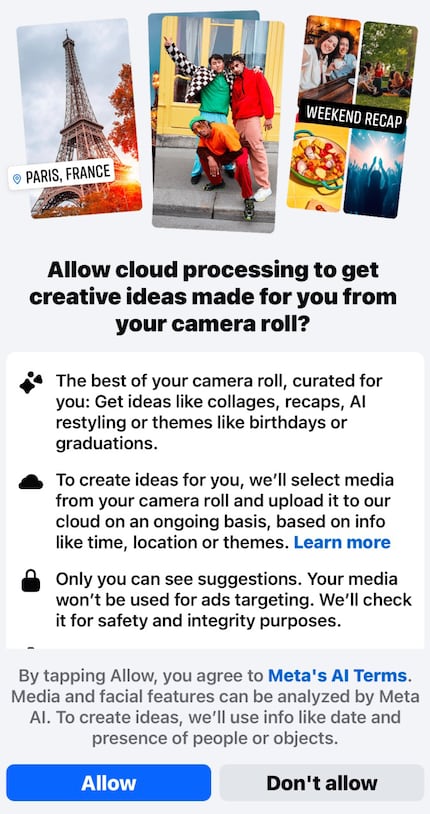
Guide
How to stop your data being fed to Meta’s AI
by Florian Bodoky

Meta wants to analyse your private photos - to give you "creative ideas" for collages and the like. Trials are already underway in North America. However, it is not yet clear what will happen to the data in the medium term.
Meta (the parent company of Facebook) is currently testing a new function that asks users whether they want to consent to «cloud processing» of their private photos. This is in the USA and Canada. However, it is also clear that this idea is to be rolled out globally in the medium term, even if there is no talk of this yet. The aim of this function is to generate AI-supported suggestions for content based on images. But not on posted images, but on images that are stored on your smartphone or the corresponding cloud (iCloud or Google Drive).
Facebook users who want to create a new story will now see a pop-up asking them if they want to share their private photos for «cloud processing». This allows Meta to upload photos and videos from your gallery to the Meta Cloud. On this basis, Facebook will then offer suggestions for collages, retrospectives or AI-based editing of the images.

The suggestions only appear in the story view and are intended to help prepare photos for sharing. The user should also retain control: No one else can see the suggestions - likewise, you make the decision as to whether the image is shared. Meta also emphasises that these photos are not used for advertising purposes.
Despite the assurance that the suggestions are for personal use only, it remains unclear how Meta will handle the uploaded images in the long term. By clicking the «Allow» button, users give their consent for Meta to analyse the photos in order to generate suggestions. Meta not only uses the images themselves, but also metadata such as the date they were taken, the location and the people and objects they contain to develop ideas.
The question arises as to what happens to the uploaded data once processing is complete. Meta states that the data is not immediately used for training AI models. However, it remains to be seen whether this could be the case in the future.
Meta already uses data from publicly shared articles to train its AI models. Now the company also wants to access private photos that have not yet been shared on Facebook or Instagram. However, despite assurances that these images will not be used for AI training purposes for the time being, Meta's terms and conditions do not provide a clear answer as to how long this data will be stored or whether it will be used for other purposes at a later date.
What is clear is that as soon as you upload the images, you transfer the rights to them to the company. The company then authorises «to use all personal information associated with the images» for the training of its AI if you have not objected to this. This is already practised for content that was previously shared. For example, a Reddit user has noticed this.
At least: Meta emphasises that the «opt-in function is». This means that you must give your express consent for the company to use your images in this way. Unlike the processing of your online content by the Meta AI, which you had to expressly object to.
I've been tinkering with digital networks ever since I found out how to activate both telephone channels on the ISDN card for greater bandwidth. As for the analogue variety, I've been doing that since I learned to talk. Though Winterthur is my adoptive home city, my heart still bleeds red and blue.